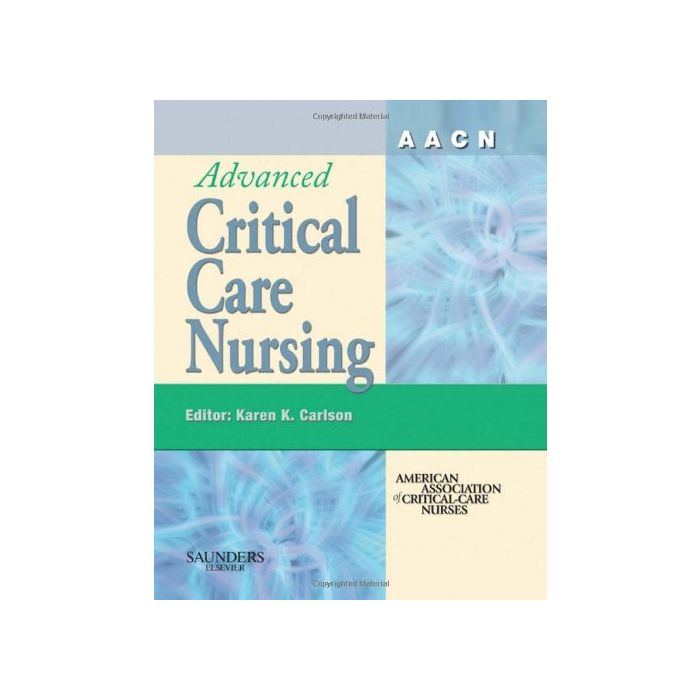AACN Advanced Critical Care Nursing

- ISBN/EAN
- 9781416032199
- Editore
- Elsevier Science
- Formato
- Brossura
- Anno
- 2009
- Pagine
- Pag. 1632<br>Saunders<br>Hardcover, Reference
Disponibile
88,99 €
Description
From AACN experts comes a resource dedicated to helping you oversee or care for critical care patients in any practice setting. This comprehensive critical care nursing textbook addresses serious and potentially life-threatening patient conditions with a foundation rooted in the critical thinking process: the comprehension, analysis, synthesis, and application of knowledge.
Reviews
-"The book provides extensive coverage of body systems, including cardiac, pulmonary, renal, neurological, haematological and multi-system disorders. There is a chapter on caring for the bariatric patient, highlighting potential complications and treatment options, including surgery. Information is presented consistently, with full-colour illustrations. Case studies and boxes on the latest research are threaded throughout, promoting engagement and critical thinking. Every chapter is supported with contemporary evidence."
Nursing Standard, April 15 2009
"This comprehensive text on critical care nursing is a pleasure to read...The material is logical, coherent and accessible and yet each author has been able to sustain sufficient depth and coverage to make it an ideal text for the postgraduate critical care students or a very handy general source text for critical care units and educators.
Nurse Education in Practice, 2009 Key Features -Endorsed by the American Association of Critical-Care Nurses (AACN), the largest specialty nursing organization in the United States, for the most authoritative coverage available. Thorough discussions of each body system emphasize advanced concepts, presenting physiology in an application format that examines the clinical implications of physiological science. Coverage of assessment focuses on interpreting abnormal findings and linking those findings to diagnosis and intervention. Appropriate interventions are discussed from an interdisciplinary, evidence-based perspective. Hundreds of new, full-color illustrations and design clarify important concepts and improve the book's usability. Complex, unfolding case studies are presented in all disease chapters, accompanied by review questions with a comprehensive answer key. Multidisciplinary Plans of Care provide at-a-glance information for common ICU conditions. Nutrition boxes appear in each relevant chapter, offering guidelines for patient needs with specific illnesses. Research-Based Practice Guidelines boxes and Promoting Evidence-Based Practice features appear throughout the text whenever applicable to present the latest research-supported nursing assessment and intervention practices. Drug boxes include common classifications of critical care drugs for specific disorders, including drug, actions, dosage, and special considerations. Applying the Technology features help you apply the latest technology to patient care. NIC Interventions boxes list NIC intervention labels appropriate for the conditions discussed in a chapter.
Nurse Education in Practice, 2009 Key Features -Endorsed by the American Association of Critical-Care Nurses (AACN), the largest specialty nursing organization in the United States, for the most authoritative coverage available. Thorough discussions of each body system emphasize advanced concepts, presenting physiology in an application format that examines the clinical implications of physiological science. Coverage of assessment focuses on interpreting abnormal findings and linking those findings to diagnosis and intervention. Appropriate interventions are discussed from an interdisciplinary, evidence-based perspective. Hundreds of new, full-color illustrations and design clarify important concepts and improve the book's usability. Complex, unfolding case studies are presented in all disease chapters, accompanied by review questions with a comprehensive answer key. Multidisciplinary Plans of Care provide at-a-glance information for common ICU conditions. Nutrition boxes appear in each relevant chapter, offering guidelines for patient needs with specific illnesses. Research-Based Practice Guidelines boxes and Promoting Evidence-Based Practice features appear throughout the text whenever applicable to present the latest research-supported nursing assessment and intervention practices. Drug boxes include common classifications of critical care drugs for specific disorders, including drug, actions, dosage, and special considerations. Applying the Technology features help you apply the latest technology to patient care. NIC Interventions boxes list NIC intervention labels appropriate for the conditions discussed in a chapter.
Maggiori Informazioni
| Autore | AACCN |
|---|---|
| Editore | Elsevier Science |
| Anno | 2009 |
| Tipologia | Libro |
| Lingua | Inglese |
| Indice | Table of Contents UNIT I: PRACTICE IN TODAY’S CRITICAL CARE ENVIRONMENT 1. The Critical Care Environment 2. Alternate Settings for Critical Care 3. Comorbid Conditions UNIT II: ELEMENTS OF CARE 4. Pain and Sedation 5. Symptom Management -Diarrhea -Vomiting/Nausea -Dyspnea 6. Nutrition 7. Thermoregulation -Hypothermia -Hyperthermia 8. Families in Critical Care 9. Improving Outcomes through Prophylaxis UNIT III: CARDIAC 10. Advanced Arrhythmias 11. Acute Coronary Syndromes 12. Heart Failure 13. Heart Disease in Women 14. Cardiac Surgery 15. Valvular Disease and Surgery 16. Vascular Emergencies 17. Cardiomyopathy 18. Heart and Lung Transplantation UNIT IV: PULMONARY 19. Acute Respiratory Failure and Acute Lung Injury 20. Mechanical Ventilation and Weaning 21. Thoracic Surgery UNIT V: NERVOUS SYSTEM 22. Head Injury and Dysfunction 23. Cerebral Vascular Disorders 24. Spinal Cord Injury 25. Special Neurologic Patient Populations UNIT VI: GASTOINTESTINAL 26. Gastrointestinal Bleeding 27. Liver Dysfunction and Failure 28. Pancreatitis 29. The Gut in Critical Illness 30. Liver, Kidney, and Pancreas Transplantation UNIT VII: RENAL 31. Electrolyte Emergencies 32. Complex Acid-Base Disorders and Associated Electrolyte Imbalances 33. Acute Renal Failure UNIT VIII: ENDOCRINE 34. Glycemic Control 35. Pituitary, Thyroid, and Adrenal Disorders UNIT IX: HEMATOLOGIC 36. Blood Conservation and Blood Component Replacement 37. Coagulopathies UNIT X: IMMUNE (CRITICAL CARE IMMUNOLOGY 38. Caring for the Immunocompromised Patient 39. Bone Marrow Transplantation UNIT XI: MULTISYSTEM DISORDERS 40. Shock and Endpoints of Resuscitation 41. Optimizing Hemodynamics: Strategies for Fluid and Medication Titration in Shock 42. Trauma 43. Systemic Inflammatory Response Syndrome and Multiple Organ Dysfunction Syndrome 44. Burns 45. Mass-Casualty Competencies UNIT XII: SPECIAL PATIENT POPULATIONS 46. Caring for the Patient in the Immediate Postoperative Period 47. Caring for the Critically Ill Pregnant Patient 48. Caring for a Pediatric Patient in an Adult Critical Care Unit 49. Caring for the Critically Ill Elderly Patient 50. Caring for the Critically Ill Patient with a Psychiatric Disorder 51. Caring for the Bariatric Patient 52. Oncologic Emergencies 53. Chemical Dependency 54. End-of-Life Care |
Questo libro è anche in:
